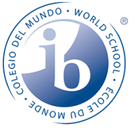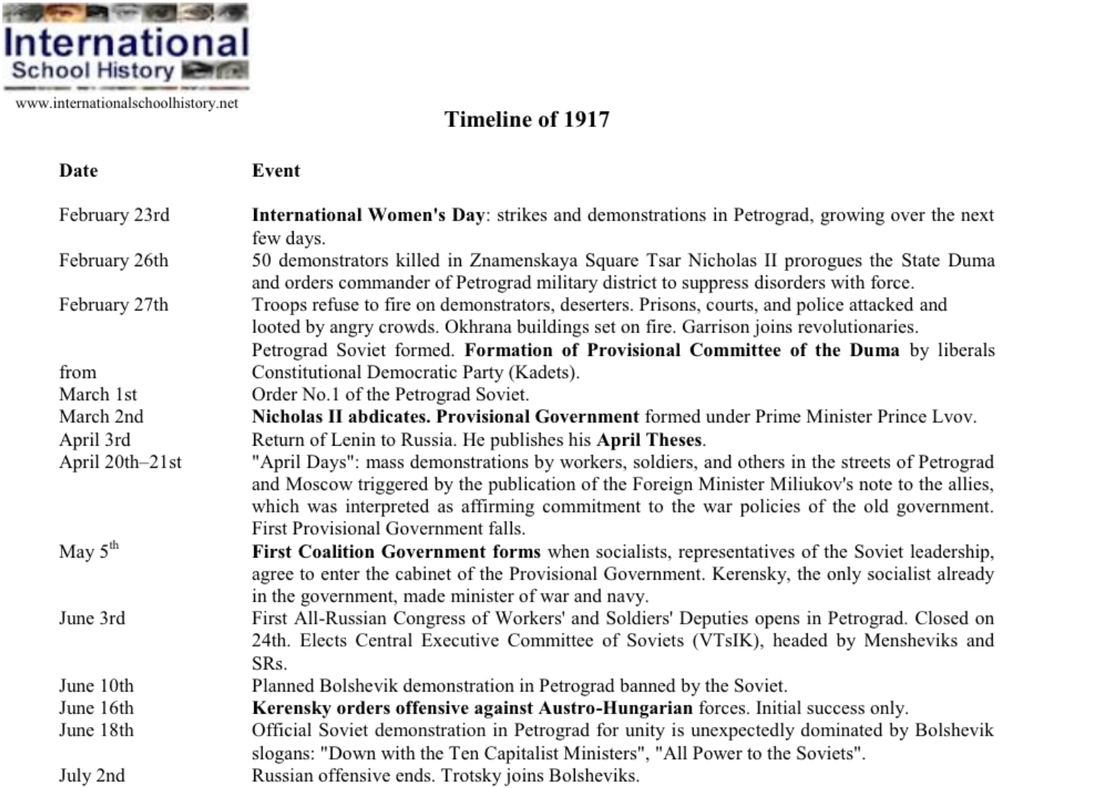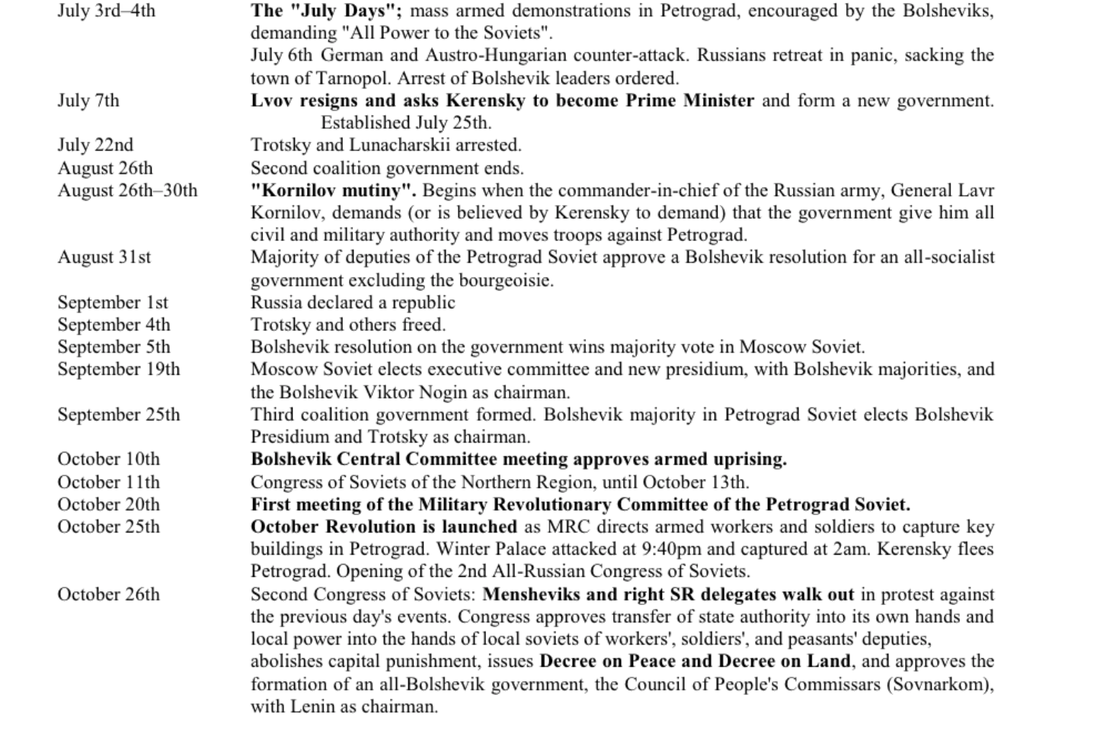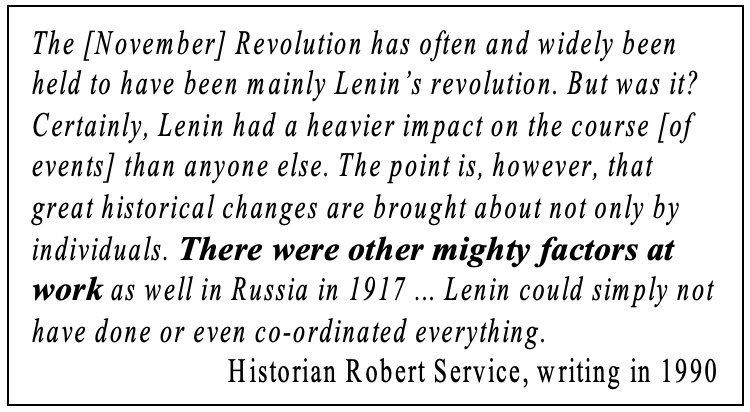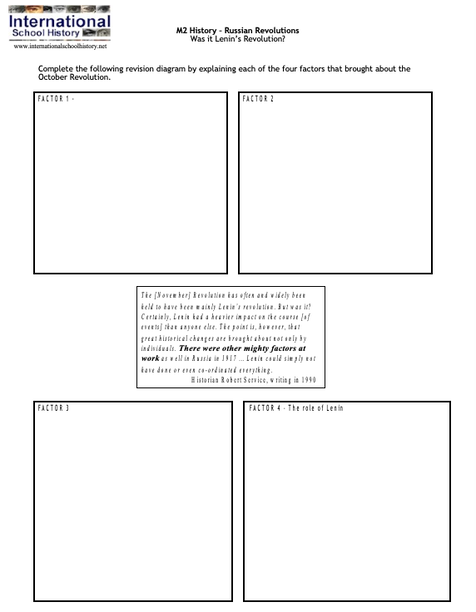Lesson 6 - The October 'Bolshevik' Revolution
|
The next three lessons feature in the IB DP syllabus as Topic 10. Authoritarian States. It is the first of two topics which are central to our coverage for the essay paper 2.
Students who wish to be considered for the Moser Double Diploma will be encouraged to complete additional assignments in this unit beginning with the additional lessons on this page and the 'extra and extension' at the end of each lesson. |
Why were there two revolutions in 1917?
‘The February revolution had been essentially the collapse of tsardom from within. The October revolution was a seizure of power by the Bolshevik Party from the Provisional Government, which had replaced the tsar but had proved no more capable of successfully leading Russia in wartime than he had.’ Michael Lynch - Reaction and Revolutions: Russia 1881-1924
To begin with you need to consider the timeline of events in 1917. The important events in bold you need to understand and remember.
To begin with you need to consider the timeline of events in 1917. The important events in bold you need to understand and remember.
|
In February 1917 the ruling class thought they were learning from history, making concessions as in 1905 to avoid losing everything. But by failing to back the tsar they were sowing the seeds for their own crisis of legitimacy. By getting rid of the tsar they were demonstrating that anything was possible. The Provisional Government in contrast remained exactly that, provisional. It lacked the traditional basis of authority that 300 years of Romanov Tsars enjoyed.
As we saw last lesson, the war so important. Mass urban discontent could have been contained by force and liberals were always wary of unleashing a revolution. This happened in 1905. What was different about 1917 was the condition of the army. The loyal soldiers (and importantly the upper-class officers) of 1914 no longer existed by 1917. In addition, the bulk of the reliable fighting force was on the front line. They did not mutiny. The Tsar was brought down by the unreliable garrison troops in Petrograd. The key factor was that the ruling class decided to abandon Nicholas. ‘What the generals and politicians had done was unleash the revolution they had sought to prevent…The people knew what they wanted; the elite did not know how to hold on to what it had. Once the Tsar was removed, the state was decapitated, authority collapsed, the whole structure of society began to unravel, and a climate of disobedience developed. It was allowed to develop by paralysis at the top. The problem was that there was really no one at the top at all, there was a vacuum: no one was prepared to take the responsibility and use force to restore law and order.’ Graham Darby, The Russian Revolution p.86
|
The Bolshevik Revolution - October 1917
|
The Provisional Government was 'elbowed out of existence by a slight push' - Isaac Deutscher - Stalin
So why did the Provisional Government fail? Four identifiable aspects:
|
|
1. Failings of the Provisional Government (or better still, the inherent weaknesses of the Provisional Government)
Perhaps this category of explanation is unfair. In reality, the Provisional Government failed to achieve the impossible. From February, central government was drained of power. With the Tsar gone, the power structure collapsed. They had to act quickly but failed to do so. How could they? The people’s demands were revolutionary, but the Provisional Government was not. They were middle class (liberal) politicians. The June offensive was meant to restore government prestige. Kerensky fell out with Kornilov and alienated the army. The Kadets who supported the war, opposed the call for a Constituent Assembly, opposed state control of the economy and would not redistribute land to the peasants largely dominated the Provisional Government!
2. Peasants, workers and soldiers disillusioned and attracted by the Marxist soviets.
3. The role of the Bolsheviks and the Soviets
When the Provisional Government failed to meet the increasingly radical demands of the people, the people set up their own committees to take direct action. However, these committees could not end the war, restore the economy or ensure food supplies throughout Russia. This is why the leadership of the Bolsheviks must be central to any explanation of October 1917.
In February 1917 a successful Bolshevik revolution looked unlikely. The Soviets were dominated by the Mensheviks and SRs, then Bolsheviks had only 10 000 members. Lenin’s return and his April Thesis would prove to be valuable later but generally the Bolsheviks made little progress. The July Days seemed to demonstrate how impotent the Bolsheviks were. Yet from this time the influence of the Bolsheviks grew.
The Kornilov Affair proved to be real turning point. By October 1917 membership stood at 300 000. People turned to the Bolsheviks because they had not been tainted by the failure of the provisional government. The Menshevik unwillingness to form a Soviet government cost them much support. As Wildman has argued, the Bolsheviks did not offer ‘a new vision of the revolution but rather a more speedy realisation of the original one’. Or as Darby puts it, ‘The Bolsheviks and their propaganda did not create the people’s programme, they merely articulated it.’ (p. 104)
4. The role of Lenin was central (see previous lesson on Lenin’s role in 1917).
His skill as a ruthless politician is acknowledged by all. His ability to persuade the Bolshevik Central Committee on the 10th October (10 votes to 2) that revolution was imminent, was critical. But also don’t forget his theoretical contribution. Kerensky’s attempted suppression of the Bolsheviks on the 24th October forced the party to defend itself.
- Failed to impose their authority on the Soviets (How could they?)
- Were too divided
- Failed to call the Constituent Assembly (to gain authority in an election they would lose?)
- Wanted to (had to?) continue the war
- Did not redistribute land (but, how could they?)
- Could not manage the economy
Perhaps this category of explanation is unfair. In reality, the Provisional Government failed to achieve the impossible. From February, central government was drained of power. With the Tsar gone, the power structure collapsed. They had to act quickly but failed to do so. How could they? The people’s demands were revolutionary, but the Provisional Government was not. They were middle class (liberal) politicians. The June offensive was meant to restore government prestige. Kerensky fell out with Kornilov and alienated the army. The Kadets who supported the war, opposed the call for a Constituent Assembly, opposed state control of the economy and would not redistribute land to the peasants largely dominated the Provisional Government!
2. Peasants, workers and soldiers disillusioned and attracted by the Marxist soviets.
- The peasants believed that land should be owned by those who worked it. ‘The goals, methods and rhythm of peasants actions during 1917 were their own’ Acton. They had shown remarkable patience, but this was running out by October.
- The proletariat had many of their demands met by February revolution. But they became increasingly radicalised in 1917 largely because of rising prices and food shortages. The increasing number of strikes were largely defensive, and motives were largely economic. They were crying out for leadership.
- The most important group were the soldiers, who were largely ‘peasants in uniform’. Like the workers, the soldiers gained many improvements after February (e.g. representative committees). The Kornilov Affair destroyed any trust that the soldiers had and consequently there was an increasing tendency to refuse to obey orders. In the case of all three groups, the continuation of the war was critical.
3. The role of the Bolsheviks and the Soviets
When the Provisional Government failed to meet the increasingly radical demands of the people, the people set up their own committees to take direct action. However, these committees could not end the war, restore the economy or ensure food supplies throughout Russia. This is why the leadership of the Bolsheviks must be central to any explanation of October 1917.
In February 1917 a successful Bolshevik revolution looked unlikely. The Soviets were dominated by the Mensheviks and SRs, then Bolsheviks had only 10 000 members. Lenin’s return and his April Thesis would prove to be valuable later but generally the Bolsheviks made little progress. The July Days seemed to demonstrate how impotent the Bolsheviks were. Yet from this time the influence of the Bolsheviks grew.
The Kornilov Affair proved to be real turning point. By October 1917 membership stood at 300 000. People turned to the Bolsheviks because they had not been tainted by the failure of the provisional government. The Menshevik unwillingness to form a Soviet government cost them much support. As Wildman has argued, the Bolsheviks did not offer ‘a new vision of the revolution but rather a more speedy realisation of the original one’. Or as Darby puts it, ‘The Bolsheviks and their propaganda did not create the people’s programme, they merely articulated it.’ (p. 104)
4. The role of Lenin was central (see previous lesson on Lenin’s role in 1917).
His skill as a ruthless politician is acknowledged by all. His ability to persuade the Bolshevik Central Committee on the 10th October (10 votes to 2) that revolution was imminent, was critical. But also don’t forget his theoretical contribution. Kerensky’s attempted suppression of the Bolsheviks on the 24th October forced the party to defend itself.
|
Activity
Using the notes above and your textbook pages 111-116, complete the revision diagram 'Was it Lenin's Revolution?' or make your own version. |
Extras and extension
|
|
|
|

